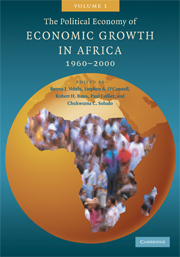Book contents
- Frontmatter
- Contents
- List of figures
- List of tables
- List of contributors
- Foreword
- List of acronyms
- PART 1 OVERVIEW
- 1 Policy plus: African growth performance, 1960–2000
- 2 Opportunities and choices
- 3 Anti-growth syndromes in Africa: a synthesis of the case studies
- PART 2 INTERPRETATION
- PART 3 EXPLANATION
- PART 4 LOOKING AHEAD
- Index
- References
3 - Anti-growth syndromes in Africa: a synthesis of the case studies
Published online by Cambridge University Press: 09 January 2010
- Frontmatter
- Contents
- List of figures
- List of tables
- List of contributors
- Foreword
- List of acronyms
- PART 1 OVERVIEW
- 1 Policy plus: African growth performance, 1960–2000
- 2 Opportunities and choices
- 3 Anti-growth syndromes in Africa: a synthesis of the case studies
- PART 2 INTERPRETATION
- PART 3 EXPLANATION
- PART 4 LOOKING AHEAD
- Index
- References
Summary
Introduction: the anti-growth syndromes
As part of the Collaborative Research project conducted by the African Economic Research Consortium (AERC) on “Explaining African Economic Growth Performance” (the “Growth Project”), a number of anti-growth syndromes were identified by the project's editorial committee based on previously commissioned project case studies and other evidence. These classifications for practically all of SSA, involving forty-six countries, as well as for the sample of twenty-six country cases, over the period between country official independence from colonial rule and the year 2000, are presented in table 3.1. These are: State controls (SC), Adverse redistribution (AR), Intertemporally unsustainable spending (IUS), and State breakdown (SB); also presented is the complementary Syndrome-free (SF) category.
As the non-weighted row of table 3.1 indicates, the classification with the largest relative frequency is SC (34 percent), followed by SF (25 percent), then AR (22 percent), SB (10 percent), and IUS (9 percent). Considering the population-weighted frequencies (table 3.1), however, the ranking changes somewhat. The AR category is now first (32 percent), followed closely by SC (26 percent), then by SF (19 percent), IUS (13 percent), and SB (10 percent). Thus, larger countries tend to be relatively skewed toward AR and IUS, while SF is less prevalent in larger states and SB is invariant to country size.
The estimates for the twenty-six case countries, also reported in table 3.1, somewhat over-estimate the incidence of SC and IUS, and slightly under-estimate that of AR and SB, relative to the forty-six-country (non-weighted) sample.
- Type
- Chapter
- Information
- The Political Economy of Economic Growth in Africa, 1960–2000 , pp. 137 - 172Publisher: Cambridge University PressPrint publication year: 2007
References
- 2
- Cited by

